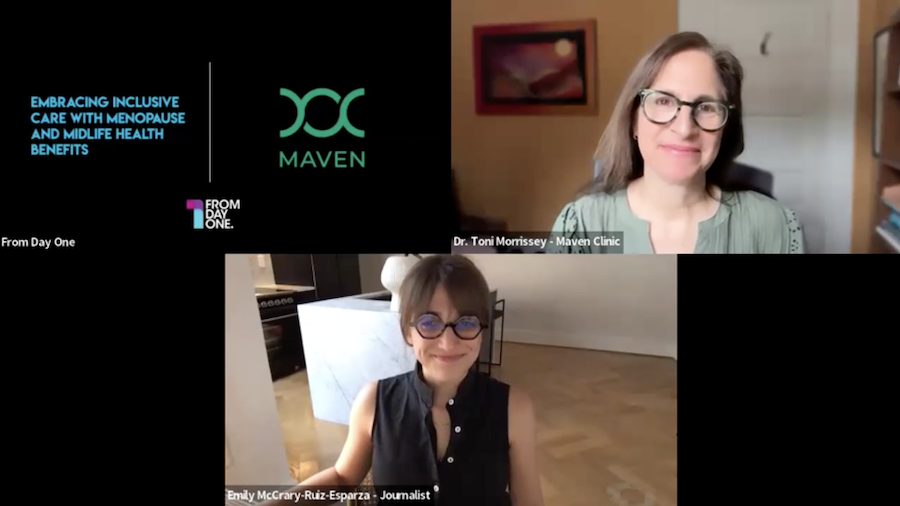Embracing Inclusive Care With Menopause and Midlife Health Benefits


When menopause became a regular topic among benefits leaders it “validated the experiences of millions of women who previously suffered in silence,” said Dr. Toni Morrissey, an OB-GYN practicing at Maven Clinic.
“We’re seeing more open dialogue, improved resources, and inclusive policies that recognize menopause as a workplace health issue and not just a personal one,” she said during a From Day One webinar on embracing inclusive care. It’s made a difference for so many women, but there’s still distance to travel.
Dr. Morrissey laid out the ways employers can design a menopause care plan that supports women, and the business, holistically. “Menopause symptoms can significantly impact productivity, retention and morale, and supporting this phase of life shows respect for longevity and loyalty in the workforce–especially when women are at the height of their careers.”
The Barriers to Menopause Care
One significant challenge is that there’s no shortage of information about menopause available online, “but the quality is a different story. We see everything from outdated advice and one-size-fits-all solutions,” Morrissey said. Not to mention miracle cures and snake oil. “I’m so glad the conversation is being held in public,” she said. “It’s time for that. But our research shows that over a third of women see menopause related ads at least a few times a week, and more than half of them say it makes them feel so overwhelmed.”
Employees need evidence-based guidance delivered by board-certified providers trained specifically in menopause care, and this is where employers have a huge opportunity. A 2023 AARP survey found that 54% of women said employers need to do more to support workers experiencing menopause. In fact, 73% of employers agreed. If companies can offer clinical, board-certified care with peer-reviewed education, “that kind of support really cuts through the noise and helps employees make confident and informed decisions about their health.”
The internet is full of myths and misinformation, like the notion that menopause lasts only a year, when in reality symptoms can last up to 10 years, Morrissey says. The biggest and most damaging myth, she said, is that “menopause marks the end of productivity. And in reality, many people hit their career peak during this stage of life, and this phase really deserves support and not stigma.”
Where Employers Can Get Started with Menopause Care
Dr. Morrissey encouraged employers to start by listening. What are your employees struggling with and where do your current benefits fall short? Build upon the needs and gaps. For instance, menopause-specific care isn’t available in some areas, and employees may need remote access to providers. Additionally, “transgender, non-binary, and intersex people experience menopause too, and they often face even greater gaps in care,” she said. Another group who often gets overlooked are those experiencing medically induced early menopause.

This is just another reason menopause care should never be siloed. It can be a meaningful component of an overall health strategy that comprises mental healthcare, reproductive care, and other midlife considerations, like caregiving benefits and career development. And because it supports high-value workers like those at the peak of their careers—consider it a retention strategy that protects institutional knowledge and leadership.
To make it work, a clear, well-communicated rollout plan is essential. “It doesn’t just offer support, it sends a powerful message, which is that your health is a business priority.”
Seeking Help for Menopause Symptoms
By the time Dr. Morrissey sees a patient, they may have been experiencing symptoms for years, symptoms that have gotten in the way of daily functioning in life and at work. “What’s heartbreaking is how many of them say they’re no longer able to do the very work that once brought them success and confidence,” she said. Proper care can make the difference. “The moment that always sticks with me is when people will say, ‘I feel like I got my life back.’ That’s what good care can do. It doesn’t just manage symptoms. It restores identity, energy and self-belief.”
Of course, stigma around menopause stands in the way of many seeking care. ERGs can be a powerful tool for forming connections, but they should be optional, and they can’t be the only avenue for support, she said, especially where cultural norms discourage open conversation about healthcare.
Employers can help normalize talk about menopause by making it a part of company-wide health education and communication. Appoint leaders as menopause champions talk about their own experience and help break down stigma. “Employees should never feel pressured to speak about their menopause experience broadly, but they should have a place that they can easily go for support, and building a supportive culture starts at the top.”
Editor’s note: From Day One thanks our partner, Maven Clinic, for sponsoring this webinar.
Emily McCrary-Ruiz-Esparza is an independent journalist and From Day One contributing editor who writes about business and the world of work. Her work has appeared in the Economist, the BBC, The Washington Post, Inc., and Business Insider, among others. She is the recipient of a Virginia Press Association award for business and financial journalism. She is the host of How to Be Anything, the podcast about people with unusual jobs.
(Photo by SDI Productions/iStock)
The From Day One Newsletter is a monthly roundup of articles, features, and editorials on innovative ways for companies to forge stronger relationships with their employees, customers, and communities.